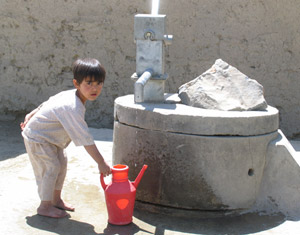
UN renews Afghan mandate
But how effective is its work?
Reading time: (Number of words: )
March 20. The United Nations today extended, by one year, the mandate of its mission in Afghanistan.
Its resolution doesn’t appear to have much meat, but plenty of high-concept political promises to “reaffirm, stress, recall, recognize, welcome, promote, continue, call upon, call for, support, request,” and finally “Decide(s) to remain actively seized of the matter.” Feel better now?
So, what will the U.N. actually DO in Afghanistan?
It has been nearly three years since I spent five weeks in Kabul. As an innocent abroad, I strolled its streets in my Western coat and tie, took photos and drank tea with chatty shopkeepers; I received many smiles and warm greetings. Most people couldn’t believe I was an American, because they had never seen an American without a combat warrior’s armored suit and black wraparound shades.
As for the U.N. I quickly gathered from the Afghans that they really didn’t have much respect. They told me that most stayed behind the reinforced concrete walls of the UN compound, forbidden to walk among the people. The only thing I ever saw of the UN were brand new huge SUVs with blacked out windows and an unfriendly antenna rising ten feet in the air. They travelled in bumper-to-bumper convoys of 4-5 and muscled their way through Kabul traffic, pissing-off scores of Afghan drivers whose beat-up little Mazdas and Toyotas were shunted aside by the big white whales.
I always wondered what important UN business required such rude line-jumping. Maybe they were on their way to some urgent like “stressing, recalling, recognizing, welcoming, supporting and requesting.”
More than once, I was nearly blown off the curb by one of these convoys which really put the pedal to the metal when they got a little daylight. Woe to the child or bicyclist who got in their way.
I did notice many things that I thought would have been the province of the UN, but were un-attended to. And I wonder, if in the past two years if their mandate has improved any of the following glaring, but solvable problems I saw.
1. Is electricity any more reliable than coming on a few hours a day, a few days a week in Kabul?
2. Can you get a telephone line for a fax machine?
3. Can you drive for more than 100 yards without having to swerve to avoid huge potholes?
4. Are there any public trash dumpsters in the neighborhoods?
5. Are there still so many hand-pumped wells?
6. Are there any street lights, traffic lights, or direction signs?
7. Can you import modern equipment without having to pay 3 levels of bribes at the airport?
8. Are there still open sewers in so many neighborhoods?
9. Do so many neighborhoods still lack schools, medical offices, and police stations?
10. Do so many children still have to spend their days carrying water up mountainsides to their homes?
11. Do so many people still pee in empty lots because there are no public facilities?
12. Are families still camped in bombed-out buildings, struggling with their rheumy-eyed insect-scarred children?
13. Has it provided jobs and assistance to the brave people who lost family, limbs and senses fighting the Taliban and assisting the West in chasing the terrorists from Afghan soil?
One acquaintance who worked at the UN was disappointed that the UN could spend $100,000 for a glitzy conference on women’s rights, but not $100 a week for bread to feed the children of women locked up in Kabul’s prisons.
I was just an innocent abroad, and surely there is more going on than I was privileged to see.
But I look to people like Greg Mortensen for my inspiration; one person, who has built 58 village schools in Afghanistan and Pakistan over the past 15 years. He started with nothing, and is supported only by small donations. I hope the UN Mandate will aspire more to his work and less to conferences; and less to “recognizing, stressing, welcoming, and deciding” etc. etc.; and less to paying high salaries to people ensconced behind blast walls or rush by the problems in convoys of white SUVs.

Poems for the Hazara
The Anthology of 125 Internationally Recognized Poets From 68 Countries Dedicated to the Hazara
Order Now










